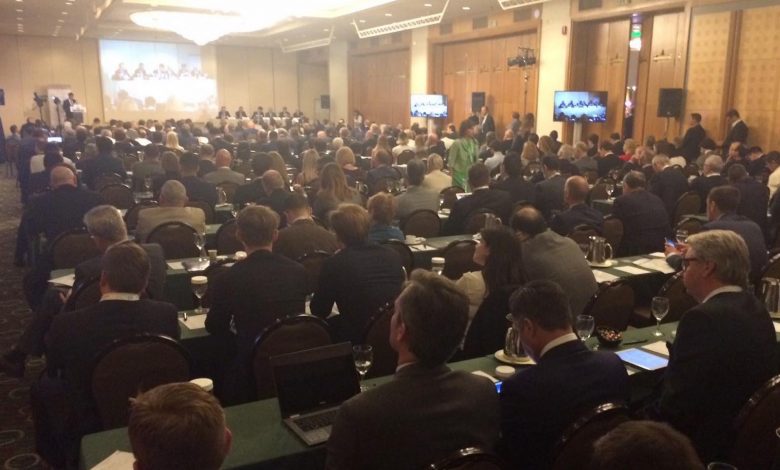Owners unite in slow steaming call to profit from the sulphur cap

The sulphur cap presents the capesize market with a once in a lifetime opportunity to cash in, delegates attending Capital Link’s Athens conference were told this morning.
A high calibre line up of big name dry bulk owners all agreed that the case was clear for slow steaming come the January 1, 2020 start of IMO’s global sulphur cap.
Stamatis Tsantianis, CEO, Seanergy Maritime Holdings, claimed: “2020 will be one of the best things to hit shipping for 20 years.”
He predicted that once the spread between MGO and HSFO widens, the natural reaction among shipowners will be to slow their ships down. With scrubber uptake so limited to date, owners will be forced to use MGO.
Tsantianis predicted the cape fleet would slow down by 20%, which would be the equivalent of 300 to 400 capesizes exiting the global fleet. This, Tsantianis suggested, could see capes trading in the region of $50,000 a day.
Philippe Louis-Dreyfus, chairman of French commodities giant Louis Dreyfus, agreed with his fellow panellist at the conference, saying: “We need to get all owners to reduce speed. It is good for the environment and good for the market.” Louis-Dreyfus has long championed slow steaming to solve the industry’s woes and he said he was “really happy” about the consensus among the panellists today who supported the movement.
Spyros Capralos, chairman of the world’s largest listed dry bulk player, Star Bulk Carriers, revealed his company is trialling scrubbers on a pair of newcastlemaxes, but he too favoured slow steaming as the best way to counter the sulphur cap. “Reducing speed is the most environmentally friendly thing to do,” he said.
“It makes sense financially, operationally and environmentally,” declared John Michael Radziwill, the CEO of GoodBulk.
The following panel at the event focused on containers and there too panellists championed slow steaming, with the chairman of the session, Mark O’Neil, president and CEO of shipmanager Columbia Marlow musing whether reducing speed was “the panacea to all shipping’s ills”.
George Youroukos, CEO of Poseidon Containers, said: “The best gift to us is what will come on January 1, 2020. The speed limitations will effect the container fleet substantially.” Youroukos said the reduced speed effect on the container fleet will be felt greater than for dry bulk as boxship engines are larger and consume more fuel.
Tanker owners also debated what will happen to the sector come 2020 with Eddie Valentis, CEO of NASDAQ-listed Pryxis Tankers, telling delegates: “Slow steaming will prevail.”
At a later session involving the heads of many of the world’s top shipowning organisations, Nikos Tsakos, the CEO of Tsakos Energy Navigation (TEN) and chairman of Intertanko, hit out at scrubbers, saying shipowners do not like to be treated like guinea pigs, and he too predicted there would be more slow steaming.
Dynacom’s George Prokopiou then came on stage in which he lashed scrubber makers and joined the increasing chorus for slow steaming in a speech that drew plenty of applause across the packed room.
“With slow speed we have an immediate solution,” Prokopiou said, adding: “From tomorrow we could have a 50% reduction by reducing the speed.”
Splash is reporting live from Posidonia all week. To access our full Posidonia archive click here.
